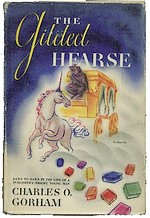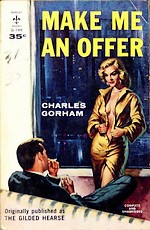
Publishing used to be a much different business, and no one could better attest to that than Donald Friede. After being kicked out of Harvard, Yale, and Princeton, a job in the stockroom of Alfred A. Knopf convinced him that he wanted to be a publisher. The novelist Manuel Komroff (little read today) then hired him as his assistant in the production department of Boni & Liveright, t
one of the hot publishers of the early 1920s. Soon after, thanks to a small fortune from his father’s exclusive rights to sell Ford motorcars to Russia (until the Revolution, of course), he was able to walk into the office of Horace Liveright and buy his way into owning half the company. It entitled him, as he puts it, to “a ringside seat at a show that has never been equaled, and probably never will be: the literary explosion of the 1920s.”
And not just the literary. Still flush with his father’s cash, he bankrolled the avante-garde composer George Antheil, whom he’d met when the two of them were rushing to witness Charles Lindbergh’s landing at Le Bourget airfield after his successful solo crossing of the Atlantic (just a minor event in Friede’s frantic narrative). He brought Antheil and his wife back to New York, rented Carnegie Hall, and kept signing checks for the composer’s ever more grandiose notions (towering skyscraper backdrops, a real firehouse siren, a wind machine). The plan was for Antheil to debut for the American audience his Ballet Mechanique, debuted the previous season in Paris, along with his Jazz Symphony. Up to the last minute Antheil was coming up with new ideas and Friede was running around trying to materialize them.
The actual performance turned out to be one of the great disasters of musical history. With all the last-minute changes, the musicians were ill-rehearsed, the music too jarring for much of the audience, and then the wind machine ran amok and subjected the front rows to a minor hurricane. News of the fiasco devastated Antheil’s musical career for years. As Friede recalls,
He hated me so very much that a few years later, under a nom de plume, he wrote a detective story about me, in the opening pages of which he had the reader discover me dead in bed, a knife stuck in my back. In the balance of the book he managed to kill off my mother, my wife, and my brother, as well as a psychiatrist whom he had met through me. It was a very thorough job and had excellent cathartic results, as our present friendship proves.
Friede was able to turn his attention back to publishing. Boni & Liveright, along with other American publishers, were enjoying a moment almost never experienced since Gutenberg invented moveable type: “There were simply not enough books being printed to supply the demand.” Publishers were chasing after every writer worth his salt and more than a few who weren’t. Some of the worst books credited to Maxwell Bodenheim and Heywood Broun, for example, can be attributed to the desperation of publishers who would take anything of 40,000 words or more and slap it between a pair of boards.

But frenzied quest for manuscripts didn’t develop the best critical judgment. Fried turned down the rights to Charles Lindbergh’s memoir of his flight, We. “No thanks,” he said. “He’ll be forgotten in six months.” We went on to become one of the biggest bestsellers of the decade. He rushed to Paris to try to persuade James Joyce to give him the American rights to Ulysses. He felt he’d win over the author by presenting him with an exclusive American edition he’d had printed just for this meeting. Joyce opened the book, noted that the colophon page credited Friede as the copyright holder, and cooly dismissed him.
That was one of a string of missed opportunities that led Friede to wander out to Chicago to meet the bookseller Pascal (Pat) Covici, who was starting to create his own literary empire. The pair got to brainstorming and Friede returned to New York with plans to set up a new publishing house: Covici-Friede. Covici and his wife moved east, and soon a five-person company (Covici, Friede, their wives, and a stock clerk) was established on West Forty-Fifth Street. Unfortunately, what they lacked was a catalog. For 1928, they relied mostly on very expensive limited editions of tasteful erotica (sketches by Alexander King) and reissues of The Sweet Singer of Michigan by Mrs. Julia Moore, which Friede admits was “probably the worst volume of poetry ever written by anybody, anywhere.”
They courted Theodore Dreiser, passed on a thousand-page first novel called O Lost! that went to Scribner’s, fell into the masterful hands of Maxwell Perkins, and emerged two years later as Look Homeward, Angel. Slowly, they began to sign better books and better writers. Wyndham Lewis (when people still bought his books) and Joseph Moncure March’s boxing poem The Set-Up. Their breakthrough came when they bought the American rights to Radclyffe Hall’s then-revolutionary lesbian novel The Well of Loneliness. Condemned as obscene in England, the book had to pass the scrutiny of the New York Court of Special Sessions, but the court ruled it acceptable and its scandalous reputation made it an instant bestseller.
Flush with pride in their critical judgments, they then listened in rapture as Ben Hecht laid out his ideas for the book that would be his magnum opus, certainly the greatest of the Great American Novels, to be titled Deliaga. As Hecht’s chapters dribbled in, however, his creative desperation was only surpassed by their dread that they’d bought an unpublishable heap of yecch. Having already sold hundreds of copies as pre-orders, they grabbed a Hecht short story that was lying around and talked him into padding it out to become A Jew in Love.
With the Great Depression now well upon them, Covici-Friede entered what Friede calls their “deadly serious, if-it-isn’t-proletarian-it-can’t-be-good phase.” And they had a good prospect for making headways with this line thanks to John Steinbeck’s Tortilla Flat and Of Mice and Men. Unfortunately, not good enough. Their creditors came knocking and Covici-Friede closed in 1938. Pat Covici moved over the Viking and signed Steinbeck’s next big novel, The Grapes of Wrath. Friede decided to try Hollywood.
At this point, a good editor would have told Donald Friede to wrap things up. The subtitle of The Mechanical Angel is, after all, “His adventures and enterprises in the glittering 1920s,” and here we are in the late 1930s, when glitter was still a scarce commodity outside the movies. Friede also entered a long period of wandering, short-lived enterprises, and marriages (including to the food writer M. F. K. Fisher in the late 1940s) — none of which he discusses here.
Instead, he pads out the book with a series of thematic chapters (I know you’re dying to read about his hobby of building radios) and what must bluntly be called old fart pontifications. The giddy fun of the crazy world of publishing, art, music, and drinking in the 1920s gets rehashed for its moral lessons and neither reader nor writer are the better for it. There are about 240 pages and 19 chapters in The Mechanical Angel. Stop at the end of Chapter 11 and you’ll thank me.

 Brooks Peters, who writes one of the most consistently interesting blogs around (
Brooks Peters, who writes one of the most consistently interesting blogs around (